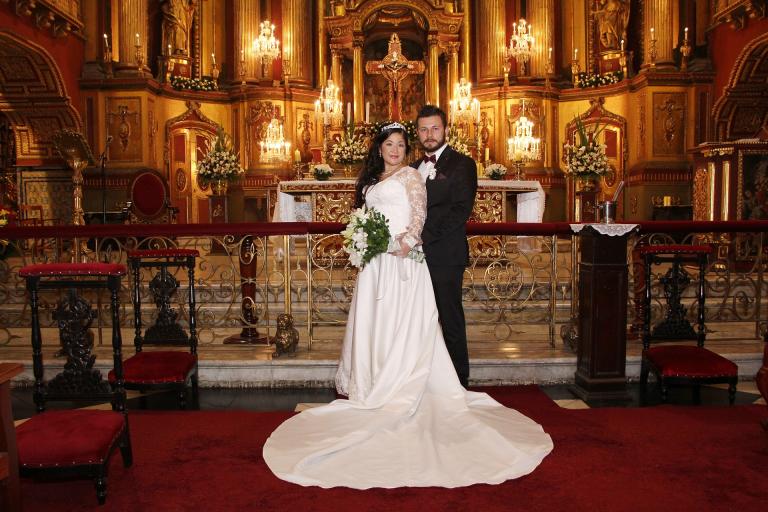I have blogged about my former student John Ehrett, who wrote that perceptive review of our book Authentic Christianity. I am glad to see that he is now writing for Patheos at his blog Between Two Kingdoms: Lutheran Musings on Christianity, Culture, and Civil Society. This will significantly enhance the Lutheran presence here at Patheos. I want to draw your attention to his discussion of the current controversy among Catholics over marriage.
First, though, read the Introduction to his blog, which quotes Hermann Sasse on the doctrine of the Two Kingdoms and suggests how he will try to apply it. I look forward to seeing how John applies the Two Kingdoms teaching to law and public policy, two of his numerous areas of expertise.
In his second post, Pope Francis, Nondenominationalist?, he discusses the controversy in Catholic circles about Pope Francis being open to allowing divorced and remarried Catholics to, in some cases, receive Holy Communion. He sees the Pope’s desire to decentralize the issue by leaving it up to individual priests to be similar to the decentralized, less dogmatic, trend of Non-denominational evangelicalism.
That is interesting in itself, but I want to focus on something he says in the course of his main subject. He looks at the Catholic doctrine that marriage cannot be dissolved, referring to the Pope’s encyclical Amoris laetitia that critics say weakens that teaching, and then raises questions about the practice of issuing annulments:
Not being Catholic myself, I’m perhaps outside my wheelhouse in even commenting on this issue, but there’s an important point in this debate that troubles me. Namely, characterizations of Amoris as uniquely disruptive to traditional teaching—or, perhaps, uniquely damaging to the sacramental view of marriage—seem (at least in my mind) difficult to square with the laxity of the existing annulment process (Douthat briefly touches on this point in a recent podcast interview). In order to obtain an annulment, a petitioner must show that one of five requisite elements of a Catholic marriage—freedom, consent, intent to be faithful, intent of the other’s good, and consent given in the presence of witnesses before a church official—was not met. Married on a beach by a Presbyterian minister? Marriage invalid. Fully expected to cheat during the marriage at some point? Marriage invalid. “Incapable of consenting” due to poor judgment at the time? Marriage invalid.
In short, the grounds for requesting annulment are so broad that they seem (at least to me) largely incompatible with the traditional “indissolubility” view of marriage. This “loophole problem” is reflected in the data: roughly 90% of annulment requests are granted (as of 2014). So, assuming both the sacramental view of marriage and that Amoris indeed represented a break from historic teaching, I’m left that the actual theological difficulties commonly attributed to Amoris really aren’t unique to that document. From the perspective of an Amoris critic, any pushback against Amoris really ought to be accompanied by pushback against a lenient annulment system.
I have blogged about the Catholic practice of annulments and how it weakens the church’s teachings about marriage. The basis of an annulment, as opposed to a divorce, is that the marriage never really took place. As John says, there are any number of very common factors that invalidate even a sacramentally-conducted marriage.
In fact, Pope Francis, in one of his infamous off-the-cuff comments that had to be walked back, said that because of the lack of authentic commitment among couples, “the great majority of our sacramental marriages are null.”
The statement was controversial, but it is surely true, given current Catholic teaching and practice. Did the couple really know what they were getting into when they got married? Marriage invalid. But that could apply to almost any young, naive couple!
The problem is that Catholics cannot know whether they are married or not. Having a marriage license and being sacramentally married in church is not enough! Their inner attitudes at the time determine whether there was a valid marriage. What if you didn’t know what you were doing at the time but do now? Are you married? Can you do anything about your past ignorance?
So if “the great majority of our sacramental marriages are null,” that would mean that most Catholic husbands and wives are just “living in sin.” Their children are illegitimate. And since sexual cohabiting outside of wedlock is a mortal sin, they will be condemned to Hell.
Furthermore, since Catholics make marriage a sacrament, which is available only through their church, all Protestants, as well as couples from every other religion and every other culture, are not really married and will merit the same eternal punishment.
Now I know that this cannot be, that Catholics do have a high view of marriage, including the teaching that it is indissoluble. But that teaching is fatally undermined by the logic of annulments.
Much better is the teaching that marriage is not a sacrament but a VOCATION, a calling from God Himself. As such, marriage is available to all human beings, of all religions and none, a function of God’s secular Kingdom, to which all belong. Marriage is grounded in the objectivity of God, rather than the subjectivity of the couples. “What therefore God hath joined together, let not man put asunder” (Matthew 19:6).
Photo by miltonhuallpa95 via Pixabay, CC0, Creative Commons

















